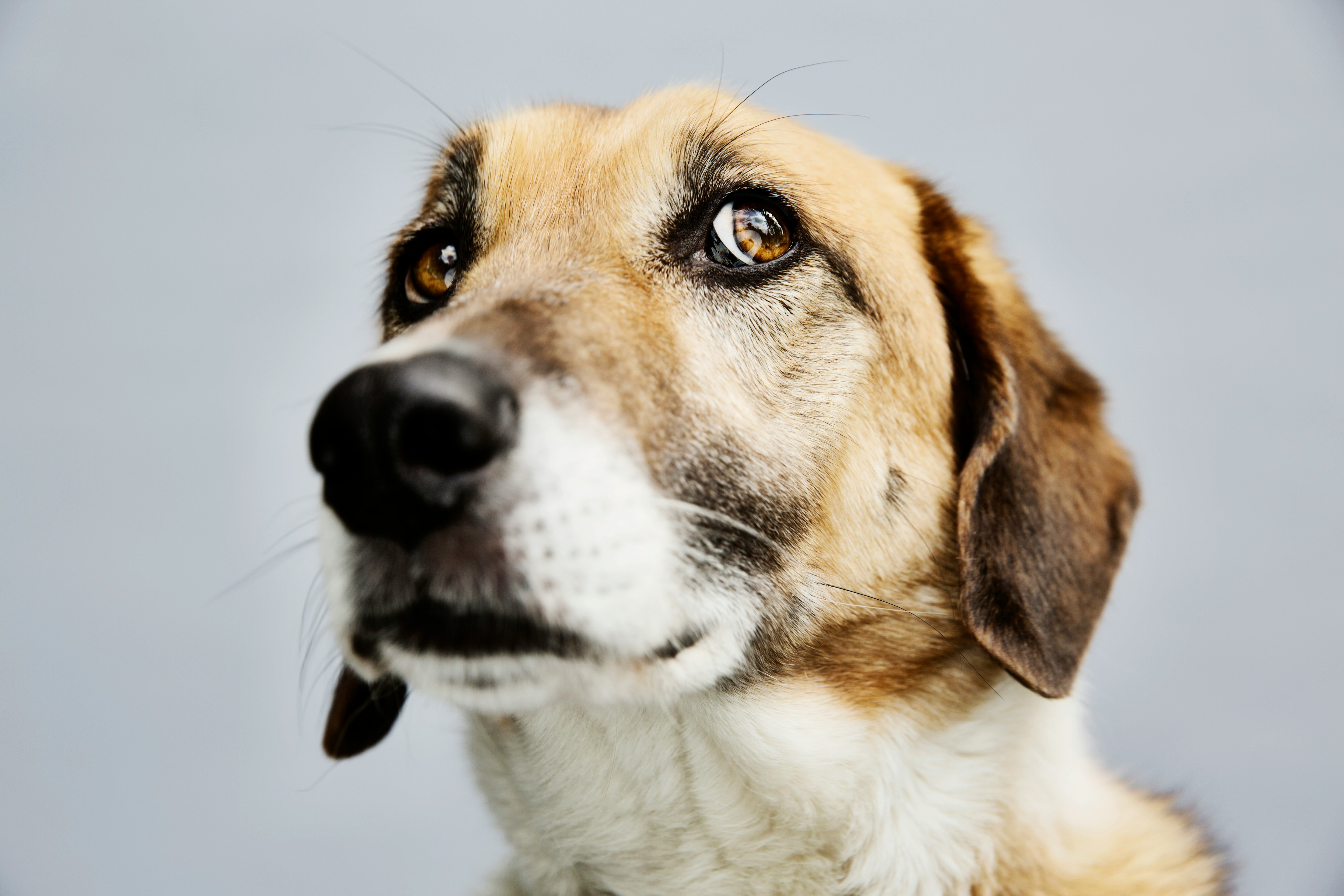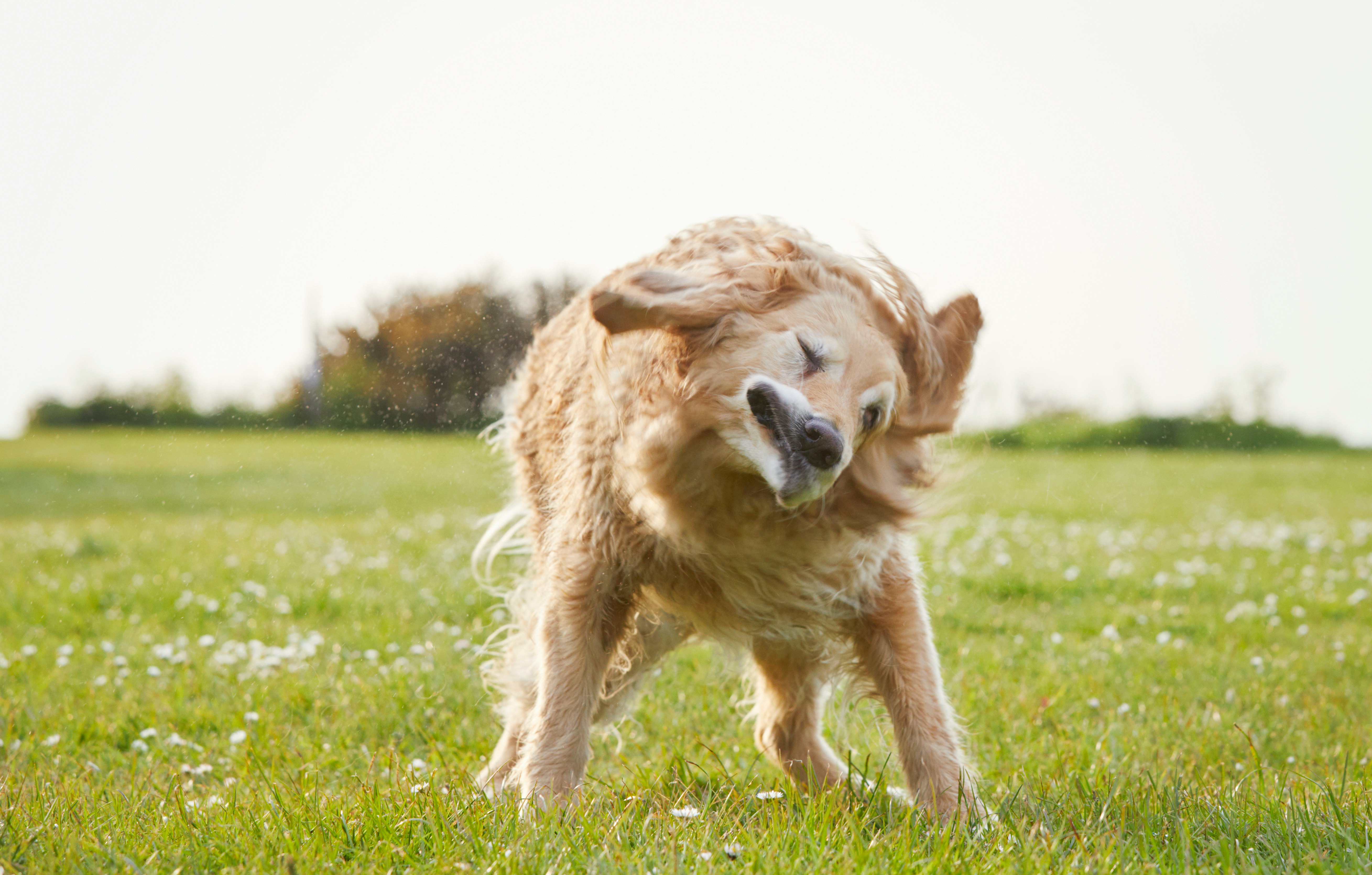
Dogs are humankind’s best friend, yet it’s striking how little we still understand them.
Research shows we’re bad at interpreting canine aggression, but that’s not the only arena in which our pups confuse us. In fact, there’s one very specific behavior that many owners struggle to understand in their pets: shaking.
This perplexing behavior can be hard to understand since it's dependent on context and body language, but with a little insight from pet experts, you should be able to figure out what’s bugging Fido.
“Shaking is a response that dogs use [in] many different situations. It could indicate that a dog is nervous or anxious, fearful, or excited,” Chyrle Bonk, a veterinarian at PetKeen, tells Inverse.
Why Is My Dog Shaking?

Fear
“One of the most common reasons for why a dog may shake is due to fear,” Katherine Pankratz, a board-certified veterinary behaviorist, tells Inverse.
To determine if your dog is frightened when they’re shaking, stay alert for other body language cues, including:
- Dilated pupils
- Ears pinned back
- Crouched posture
- Leaning away
Anxiety or Stress
“Similar to how our anxiety or stress can cause our hands or body to tremor, dogs can experience a very similar sensation,” Carling Matejka, a veterinary spokesperson for pet food company Solid Gold, tells Inverse.
Just like humans have “flight-or-fight” evolutionary responses, so do our dogs. When a stressor triggers anxiety, canine muscles become primed to act, causing them to twitch or shake.
“If your pet is anxious, do your best to provide them with comfort by creating a safe place for them and talking in a calming voice,” Matejka adds.
Environment
If your dog is shaking because they’re upset, it’s possible something in their environment is causing them discomfort or stress. Here are a few of the most common examples.
Extreme Cold
“Pups can shiver from being cold, just like people,” Lorraine Rhoads, environmental biologist for pet daycare company Dogtopia, tells Inverse.
Small breeds with smooth coats are more prone to temperature changes. If you’ve got one of the following pups, consider putting a sweater on them before heading out for a walk in the winter.
- Miniature pinchers
- Daschunds
- Chihuahuas
Triggering Noises
Dogs can be sensitive to sound, so it’s not surprising their body language will signal discomfort — such as through shaking — when they’re assaulted by unusual noises.
“Triggers that I think would cause a dog to really have a strong reaction are going to be gunshots, fireworks, backfiring cars, or motorcycles,” Leigh Siegfried, founder of Opportunity Barks.
Matejka says that fireworks and thunderstorms will also trigger shaking in some dogs.
New situations or people
Introducing your pet to new social situations or settings, unfamiliar objects, other humans, or even other dogs can cause fear, which may prompt shaking.
“Certain locations may cause dogs fear, especially new locations or locations where they had experienced something fearful in the past,” Pankratz says.
Health Reasons
If your dog experiences repeated shaking, you should consult a veterinarian to rule out life-threatening conditions. Shaking — whether in the form of bigger convulsions or less noticeable tremors – accompanied by the following warning signs should be taken very seriously and solicit medical attention.
- Panting
- Vomiting
- Pacing
- Whining
- Weakness/Pain
- Lethargy/Tiredness
- Agitation
- Difficulty breathing
- Stomach upset
- Behavioral changes
- Physical Wounds
- Lack of coordination
Pankratz explains several different health conditions — ranging from infections to seizures — can trigger shaking. Muscle twitching, also known as “tremors” can masquerade as ordinary shaking, but it’s actually a sign of more complex medical ailments, including these four issues:
- Neurological disorders
- Metabolic disorders
- Infections
- Toxins
Let’s break down some of these conditions in greater detail — including warning signs to spot.
Seizures
Uncontrollable shaking suggests your dog may be experiencing a seizure, and you should call an emergency veterinarian right away to seek treatment.
“Veterinarians can diagnose a seizure condition and offer medication to help control them if necessary,” Rhoads says.
Poisoning
Even if you haven’t noticed your dog consuming odd, it’s possible your pet has ingested a poisonous substance without your knowledge and needs immediate medical attention.
“If you notice other symptoms like vomiting or heavy panting, call your vet or emergency vet right away. Those may be symptoms of poisoning, and your dog is telling you ‘I need help!” Rhoads says.
Low blood sugar
Like their human owners, dogs require adequate blood sugar, or glucose, for their muscles to work properly. Hypoglycemia is a condition that occurs when pets have low blood sugar levels.
“When the blood sugar gets really low, muscles become starved of glucose and cannot contract or relax properly,” Matejka says.
Muscle twitching due to low blood sugar will usually look different than a pup shaking due to anxiety. It will often be accompanied by one or more of the following symptoms:
- Increased hunger
- Impaired vision
- Confusion
- Lack of coordination
- Weakness
- Low energy
- Seizures
- Restlessness
- Tremors
- Loss of consciousness
- Heart palpitations
If you notice these symptoms, along with muscle twitching, contact your veterinarian. They can conduct a blood test to see if your dog’s sugar levels are sufficient.
Excitement

If your dog is doing the jitterbug when you arrive home or just before dinnertime, it’s probably because they’re overjoyed to greet their favorite human or eager to chow down.
“Does your dog do the wiggle, waggle dance, and shiver when you get home from being away? This is likely due to excitement,” Rhoads says.
So it’s not always a bad sign that your pup is shaking. They might simply be over the moon to see you. They’ll soon calm down, and the shaking will stop.
What Should I Do If My Dog Won’t Stop Shaking?
If your pet is shaking due to anxiety or stress and holding tension in their muscle, it’s worth learning how to soothe your pet. Siegfried says that repetitive gentle strokes can help your dog stop shaking and provide the emotional reassurance they need to handle a tough situation.
In other cases, though, it’s best to consult a veterinary professional since it may not be clear what’s ailing your pet — and uncontrolled shaking could indicate a medical emergency like a seizure.
“If your dog is suddenly shaking with no known cause, contact your veterinarian,” Bonk says.







